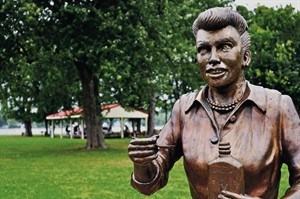
6 years later, Lucille Ball’s hometown seeks makeover for its statue honouring comedy legend
CELORON, N.Y. – They may have loved “I Love Lucy” but many in Lucille Ball’s western New York hometown have no affection for her life-size statue in a local park.
Since the bronze sculpture was unveiled in 2009 in Lucille Ball Memorial Park in the village of Celoron, the statue has been blasted by critics who say it bears little or no likeness to the popular 1950s sitcom actress and comedian.
Village officials told The Post-Journal of Jamestown (http://bit.ly/1C6HeaH ) that they’ve talked to the sculptor about making changes to the statue’s face, but the artist wants as much as $10,000 to alter his artwork. Other sculptors have quoted a price tag of about $5,000.
“We’d like to work with the original sculptor, and wish he would stand behind his work enough to step up and fix it for free,” Celoron Mayor Scott Schrecengost told the newspaper.
He said no taxpayer funds will be used for the statue project. The village has started a fundraising effort to pay for the sculpture’s makeover.
A statue replacement campaign has been launched on Facebook with the name, “We Love Lucy! Get Rid of this Statue.”
The statue was commissioned privately by a couple who hired a sculptor from neighbouring Jamestown, 60 miles south of Buffalo. The 400-pound statue was installed in August 2009 in a park Celoron, where Ball spent much of her youth.
The statue depicts Ball with her signature swept-up hairdo, but the sculpture’s face has been described by some online critics as “a nightmare” that resembles a drunken zombie. The sculpture shows Ball holding a spoon and a bottle of Vitameatavegamin, a fictional elixir featured in one of her most famous episodes.
Join the Conversation!
Want to share your thoughts, add context, or connect with others in your community?
You must be logged in to post a comment.


















